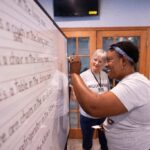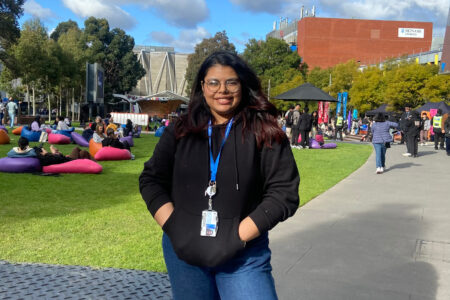
When it comes to titles, Francis Ayomoh prefers to stay humble.
He qualifies for the title “public health practitioner,” a person who works directly with people and communities to improve health through programmes and interventions.
He can use the title “public health expert” — i.e. a person with deeper training and focuses on research, policy, or leading public health efforts — as well.
But Ayomoh wants neither title. Even with his vast experience in Nigerian healthcare — first as a medical doctor, then in policy and planning — he describes himself cautiously.
Sometimes, he avoids using any of these terms whenever people call for his opinions.
“When people say I’m an expert in public health, I humbly try to run away from calling myself that,” he says.

Wanting to reshape Nigerian healthcare, Ayomoh moved on from clinical medicine and pursued public health instead. Source: Francis Ayomoh
What Ayomoh is, though, is a lifelong learner.
The Nigerian has worked his way to the peak of the academic ladder in hopes of returning home to contribute to his country.
“Recently in Nigeria, we’ve got some support from the World Bank to focus on primary healthcare systems and health system governance,” he explains. “So I’m hoping to support those initiatives to see how resources could be better utilised and then prioritised to strengthen the primary healthcare system.”
And with his track record thus far, Ayomoh is likely to bring positive change.

Ayomoh with his lecturers: Professor Elias Mossialos and Professor Aduragbemi Banke-Thomas. Source: Francis Ayomoh
Master’s degrees that bring the greatest impact to Nigerian healthcare
His introduction to the public health field came from short online programmes from Harvard University and Johns Hopkins University.
At this point, he already held a Bachelor of Medicine, Bachelor of Surgery degree from the University of Jos.
After his brief but comprehensive time with two of the most prestigious US universities (#3 and #6, respectively, according to the US News & World Report), he scored a human resources position at the Nigerian Federal Ministry of Health and Social Welfare’s health team.
There, he gained more exposure to understanding policy decisions and was given opportunities to develop ideas on how the government should reposition the health workforce for universal health coverage.
This experience led him to acquire the Mandela Washington Fellowship, a flagship initiative of the US Department of State’s Young African Leaders Initiative (YALI), designed to strengthen the leadership capacity of emerging African leaders and amplify their impact in their home countries and communities.
Through it, Ayomoh spent six weeks at the University of Wisconsin–Madison in the Public Management track of the Fellowship.
This experience set the stage for his next big step: pursuing a master’s degree at one of the world’s top universities.

Ayomoh at his graduation from LSE, ready to change Nigerian healthcare for the better. Source: Francis Ayomoh
He was awarded a scholarship by the Commonwealth Scholarship Commission in the UK to pursue an MSc in Health Policy, Planning and Financing, jointly offered by the London School of Hygiene and Tropical Medicine and the London School of Economics and Political Science.
“That decision to do the MSc Health Policy, Planning & Financing was actually tailored to what I saw were the problems in the [Nigerian healthcare] system at the time,” he says. “And there was also a problem of how we plan a health sector, not just for the short or medium term, but thinking long term and then, more importantly, how do we make policies work for people, especially given my passion for population health.”
But a master’s degree was not enough fill in the huge gaps in Nigeria’s healthcare system.
This ambition is what led him to do a DPhil in Primary Health Care at the University of Oxford.
Here, he focused on how Nigeria’s maternal healthcare services can shift tasks from highly trained professionals — like doctors or specialists — to workers with less formal training, such as nurses, midwives, or community health workers.
Once or twice a year, he even got to teach MSc in Translational Health Sciences students.
“I teach courses like health financing for universal health coverage, global health, and some health policy, sometimes drawing from either my previous experience working in the Ministry of Health or my previous experience from my master’s,” he says.

Ayomoh in one of his lectures at the University of Oxford. Source: Francis Ayomoh
Advice for future public health students seeking to improve Nigerian healthcare
After graduating in 2024, Ayomoh is aiming to do even more.
“I’m not hoping to limit myself to Nigeria as opportunities arise,” he says. “Having had the opportunity to work across countries like in Kenya, Liberia, and some other countries, I’m hoping to see how I do not limit the impact of my knowledge and experience to only Nigeria, but more centrally focused on the African continent supporting countries to improve their health financing approaches and strengthen their primary healthcare systems with the aim of attaining universal health coverage.”
He advises students seeking to follow his footsteps to expand their network.
Whether it’s talking to students from China, Thailand, the US, Bangladesh, Kenya, or South Africa, there’s a whole lot to learn from just speaking to different people.
“Because there’s something that might have worked in that country based on their context that you can bring home,” insists Ayomoh. “The future of public health and of leadership belongs to people who are globally minded and locally rooted.”










